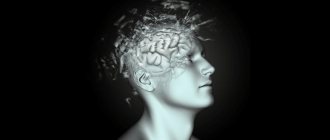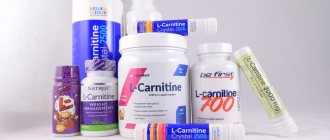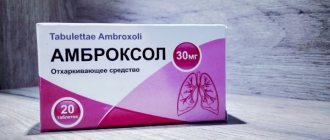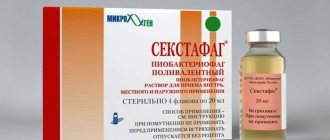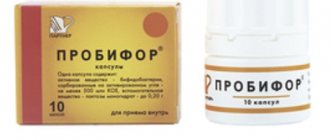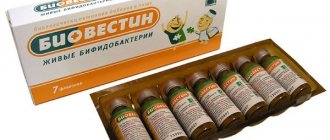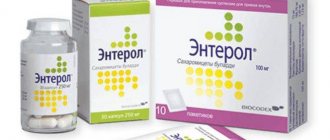Mental disorders can manifest themselves in various behavioral disorders. Some people do not pay attention to everyday situations, others get very irritated and perceive any little things too violently, showing aggressiveness. It is for such people that there is a neuroleptic drug in Neuleptil drops, which is called a “behavior corrector.”
Compound
Depending on the release form, the chemical composition of the drug may differ. In 100 ml. Neuleptil drops (4% oral solution) contain 4 grams of pericyazine (the active medicinal compound), as well as such excipients as: purified water (100 ml.), glycerin (15 g.), ascorbic acid (0.8 g. ), peppermint leaf oil ( 0.04 g), sucrose (25 g) and E150d (caramel, 0.2 g), tartaric acid (1.65 g) and 96% ethanol (9 .74 g).
One Neuleptil capsule contains 10 mg. pericyazine , as well as such auxiliary compounds as magnesium stearate (3 mg.) and calcium hydrogen phosphate dihydrate (137 mg.). The capsule itself contains chemicals such as gelatin and titanium dioxide .
Release form
As a rule, a bottle made of dark glass with a fluorescent yellow-brown solution with a mint odor, a nominal volume of 30 or 125 ml, intended for oral administration, is placed in one cardboard package. For ease of use of the drug, the drug is equipped with a special dispenser syringe.
Hard gelatin capsules No. 4 containing the active compound in the form of an odorless yellow powder are packaged in blisters of 10 pieces and placed in a cardboard package.
Pharmacodynamics and pharmacokinetics
Since the drug belongs to the group of antipsychotics , which, in turn, are piperidine phenothiazine derivatives , Neuleptil blocks serotonergic, adrenergic and dopaminergic D2 receptors , as well as m-cholinergic receptors . A drug without a stimulant component has an antipsychotic , and in addition, sedative, antiemetic, parasympatholytic, adrenolytic and hypothermic effect .
The drug potentiates the activity of non-narcotic as well as narcotic hypnotics and analgesics . In addition, the drug, having a sedative effect on the body, reduces the level of aggressiveness and excitability, and also acts as a sleeping pill. Since Neuleptil is characterized by a selective normalizing effect , this drug is classified as a means of correcting the behavior of children.
Pharmacological properties
Neuleptil is characterized by antispasmodic, sedative, hypnotic, antipsychotic, and antiemetic effects on the body.
Pharmacodynamics
Periciazine is an antipsychotic that belongs to the group of piperidine phenothiazine derivatives, which have antidopaminergic activity. This explains the development of the therapeutic antipsychotic (there is no stimulant component) effect, as well as the hypothermic and antiemetic effects of the drug. However, antidopaminergic activity is also responsible for the occurrence of side effects from taking periciazine (hyperprolactinemia, movement disorders and extrapyramidal syndrome).
The antidopaminergic activity of the active substance Neuleptil is characterized by a moderate degree of severity, as a result of which it has a moderate antipsychotic effect in moderately severe extrapyramidal disorders. Periciazine blocks adrenergic receptors of the reticular formation, located in the brain stem, and central histamine receptors, which causes a noticeable sedative effect, which is considered a desirable clinical effect, especially in angry and maliciously irritable types of affect. At the same time, the decrease in aggressiveness is not accompanied by the development of inhibition and lethargy. Unlike chlorpromazine, periciazine is characterized by a more pronounced antiemetic, antiserotonin and central sedative effect, but a less pronounced antihistamine effect.
Periciazine reduces disinhibition, aggressiveness, and excitability, which proves its effectiveness in behavioral disorders. For this reason, it is known among experts as a “behavior corrector.”
The antiallergic properties of the drug are explained by the blockade of peripheral H1-histamine receptors. The consequence of blockade of peripheral adrenergic structures is its hypotensive effect. Neuleptil also exhibits anticholinergic activity.
Pharmacokinetics
After oral administration, pericyazine is well absorbed, but, like other phenothiazine derivatives, it is involved in intensive first-pass metabolism in the liver and/or intestines. This leads to the fact that the content of unchanged pericyazine in the blood plasma is less than with intramuscular administration and varies over a wide range.
After oral administration of 20 mg of Neuleptil (2 capsules), the maximum concentration of its active component in plasma is reached within 2 hours and is equal to 150 ng/ml (410 nmol/l).
Periciazine is approximately 90% bound to plasma proteins. At the same time, it intensively penetrates tissues and passes through histohematic (including blood-brain) barriers. Most of the substance is metabolized in the liver through conjugation and hydroxylation. Metabolites contained in bile can be reabsorbed in the intestine. The half-life of pericyazine varies from 12 to 30 hours, and the elimination of metabolites is an even longer process. Conjugated metabolites are excreted in the urine, and the rest of periciazine and its metabolites are excreted in feces and bile.
In elderly patients, the elimination of pericyazine and its metabolites slows down somewhat.
Contraindications
This medicine is not recommended for use if you have the following conditions:
- closed glaucoma;
- Parkinson's disease;
- porphyria and agranulocytosis , including in history;
- prostate diseases .
In addition, you should not take Neuleptil together with Levodopa during the therapeutic treatment of Parkinson's , as well as in case of hypersensitivity to the active compound periciazine and to other components of the drug. The drug should be used with extreme caution in elderly patients, as well as those suffering from liver or kidney failure and diseases of the cardiovascular system .
Overdose
Symptoms of an overdose of Neuleptil include depression of the central nervous system, which can progress from slight drowsiness to a coma accompanied by areflexia. Patients with initial manifestations of intoxication or moderate intoxication often experience a delirious or excited state, anxiety, agitation, and clouding of consciousness. Other symptoms of overdose include cyanosis, apnea, depression of the respiratory center, a sharp drop in blood pressure, ECG changes, ventricular arrhythmias, tachycardia, difficulty swallowing, collapse, muscle hypotension, muscle twitching, dystonic movements, convulsions, muscle rigidity or spasms, tremors, constriction pupils, hypothermia. The development of polyuria, causing dehydration, and severe extrapyramidal dyskinesia is also likely.
Treatment of an overdose of Neuleptil is carried out exclusively in a specialized department of the hospital, where continuous monitoring of the functions of the cardiovascular and respiratory systems can be organized until signs of a health threat completely disappear. Symptomatic therapy is usually prescribed.
If Neuleptil was taken less than 6 hours ago, it is recommended to perform gastric lavage or aspiration of its contents. The use of antiemetics is considered unacceptable due to the increased risk of aspiration of vomit against the background of extrapyramidal disorders and/or lethargy. Activated carbon can be taken. There is no specific antidote.
Therapy should be aimed at maintaining the vital functions of the body. If there is a sharp drop in blood pressure, the patient should be placed in a horizontal position and his lower extremities should be elevated. Intravenous fluid infusion gives good results. If the administration of fluid is insufficient to eliminate the manifestations of hypotension, the administration of phenylephrine, dopamine or norepinephrine is allowed. The administration of epinephrine is contraindicated.
With hypothermia, symptoms can be expected to resolve spontaneously, unless body temperature drops to a level at which cardiac arrhythmias are likely to develop (approximately 29.4 °C).
When normal body temperature is restored and metabolic and hemodynamic dysfunctions are eliminated, supraventricular or ventricular tachyarrhythmias usually disappear. If life-threatening arrhythmias persist, it is advisable to administer antiarrhythmic drugs. It is recommended to avoid lidocaine and other long-acting antiarrhythmic drugs.
If the respiratory center and central nervous system are depressed, the patient is sometimes transferred to artificial ventilation and antibiotic therapy is prescribed to prevent infectious diseases of the lungs.
Severe dystonic reactions are often eliminated by intravenous or intramuscular administration of orphenadrine (20–40 mg) or procyclidine (5–10 mg). Relief of seizures is possible with intravenous administration of diazepam.
For extrapyramidal disorders, intramuscular administration of anticholinergic antiparkinsonian drugs is recommended.
Side effects
When taking Neuleptil, the following side effects of the drug may occur:
- dyskinesia ( oculomotor crisis , trismus , spasmodic torticollis );
- anticholinergic effects;
- depression and sudden mood swings;
- extrapyramidal disorders;
- dry mouth;
- hypotension;
- constipation;
- urinary retention;
- paresis of accommodation;
- impotence;
- amenorrhea;
- frigidity;
- drowsiness;
- galactorrhea;
- hyperprolactinemia;
- hypertemia;
- gynecomastia;
- weight gain;
- jaundice;
- agranulocytosis;
- photosensitivity.
Neuleptil drops, instructions for use (Method and dosage)
First of all, it is worth emphasizing that the dosage of the drug, as well as the schedule for its use, depends on the patient’s condition, the complexity of the disease, as well as the doctor’s prescriptions. In addition, the form of release of the drug is not least important.
In accordance with the instructions for Neuleptil drops should be taken orally:
- for adult patients in a dosage of 30 to 100 mg. 2-3 times a day;
- for children over 3 years of age in a dosage of 0.1 to 0.5 mg. per kilogram of body weight.
The above doses may be adjusted in case of urgent medical need. However, the maximum daily dose of the drug for adults should not exceed 200 mg. The drug in capsules is used during the treatment of adult patients and similar doses of 30 to 100 mg are used. per day.
Reviews of use in adults
Vitaly, 37 years old
Neuleptil was prescribed to my best friend. He never had mental problems, he was always a calm and adequate person. But after we served for a year in a hot spot and returned home, everything changed a lot. I survived everything I saw there, but he didn’t. His family said he became very irritable and even aggressive, had emotional outbursts over small things, and had trouble sleeping. After treatment with this drug, he became much calmer, at least his aggressiveness disappeared.
Svetlana, 29 years old
I lost a person very dear to me, against this background I first fell into a depressed state and complete apathy towards life, and thoughts of suicide visited me more than once. Over time, this condition turned into a feeling of constant anxiety. She became aggressive and reacted inappropriately to people, and could start a scandal in the middle of the street over trifles. I went to the doctor and was prescribed Neuleptil, I used it for a long time, I noticed the effect after a month - my behavior began to change, and all my friends noticed this. Therefore, I was satisfied with the drug.
Interaction
It is strictly prohibited to use this drug in combination with Levodopa , since mutual antagonism between these two drugs has been established. The effectiveness of Neuleptil is significantly reduced when drinking alcohol, as well as when taking Guanethidine, Sultopride and other drugs related to antihypertensive drugs and affecting ventricular fibrillation.
Great care should be taken when using Neuleptil together with antihypertensives , drugs that affect the nervous system, as well as antacids, anticholinergics , including atropine .
special instructions
If a side effect of the drug such as fever , you should immediately consult a doctor in order to conduct a blood test and rule out agranulocytosis . During treatment with Neuleptil, it is prohibited to drink alcoholic beverages.
When using the drug during treatment of patients with epilepsy , constant electroencephalological monitoring . In addition, special attention should be paid to the following groups of patients when treating with pericyazine:
- To old people;
- people suffering from diseases of the cardiovascular system ;
- people with renal and liver failure .
drowsiness may occur when taking the drug , especially at first, patients should avoid any activity that requires increased attention (driving a vehicle or working with potentially dangerous mechanisms).
Indications for use
The drug is used in psychiatry and neurology for the following conditions:
- acute mental disorders that are associated with increased aggressiveness (as symptomatic therapy);
- chronic mental disorders: hallucinatory psychoses, schizophrenia, paranoid delusional disorders, non-schizophrenic delusional disorders (in these conditions the drug is used for the treatment and prevention of relapses);
- state of anxiety, dangerous, aggressive behavior, psychomotor agitation.
For anxiety conditions, the drug is used as an additional treatment drug in complex therapy or for short-term treatment.
During pregnancy (and lactation)
Although the use of the drug during pregnancy is not prohibited, in some cases, during long-term therapeutic treatment with Neuleptil, women experienced extrapyramidal and gastrointestinal disorders , for example, bloating and others. Therefore, first of all, it is advisable to find out whether the expected benefits of taking the drug will exceed the possible harm.
In addition, it is recommended to reduce the duration of drug treatment during pregnancy . If medical necessity requires the use of the drug in the third trimester, then it is recommended to monitor nervous system .
Due to the lack of reliable data on the effect of the drug on breast milk, Neuleptil is not recommended for use during lactation .
Analogs
The most popular drugs that have a similar therapeutic effect are:
- Periciazine.
- Thiodazine.
- Sonapax.
- Haloperidol.
- Parnasan.
- Solian.
- Risset.
It is strictly prohibited to use these drugs on your own initiative; when prescribing any antipsychotic drug, you must consult a doctor and determine the severity of the condition.
Neuleptil price, where to buy
The price of Neuleptil (4% solution with a dispenser syringe) averages 1,300 rubles per bottle with a nominal volume of 125 ml.
- Online pharmacies in RussiaRussia
ZdravCity
- Neuleptil solution for internal
approx. 125ml A.Nattermann and Cie. GmbH RUR 1,402 order
